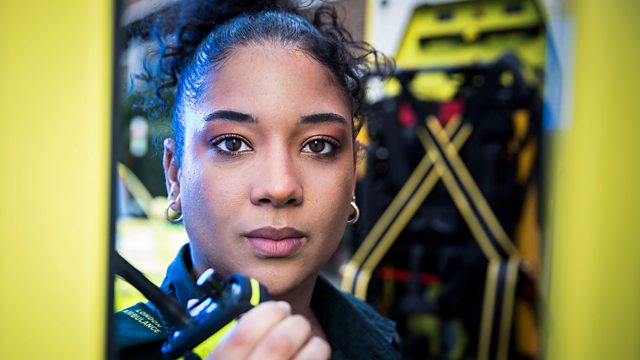Dispatchers Karen and Lucy face an overwhelming surge of urgent calls, while crews out on the road grow frustrated by frequent callers taking up valuable emergency resources.
We follow crewmates Shyr-Nai and James alongside the team in control in London, including dispatchers Lucy and Karen, and call handler Nicole, as they are faced with a flurry of nuisance callers which take up time and resources from patients in need of immediate emergency treatment.
We join the team in control as they respond to an emergency call with reports of multiple patients bleeding in a pub. Clinical team manager, Oz, and crewmates Ada and Kerry are sent to the scene alongside police, as there is a fear the job could be a terrorist incident. After multiple resources are deployed, the crews find no injured patient at the scene, and they conclude the call was a hoax. Meanwhile, other patients in genuine need are still waiting.
Long delays mean a 79-year-old patient has been waiting on the floor for over seven hours for an ambulance, while dispatchers Karen and Lucy try to keep on top of the demand by juggling resources. As soon as crewmates Shyr-Nai and James come clear, they are dispatched to another elderly patient who has been on the floor for 24 hours after being discovered by a neighbour. They settle her into her armchair and even share a few laughs about her favourite tipple before leaving her safely at home. They are pleased to award her ‘Patient of the Day’.
Call handler Nicole takes a distressing call for an elderly lady who has been hit by a bus. While the team in dispatch grapple to find the right resources, crewmates Shyr-Nai and James are tied up at the scene with a frequent caller who lives just 500 metres away from his local hospital. While they attempt to convince the patient to go to hospital, James considers the challenges of some frequent callers on the ambulance service: 'Often they just want to be reassured by us. A lot of people could help us by making their own way into hospital if they’re able to do so. The ambulance service is so stretched. Ultimately, we all have to look after it.'
As call handlers answer a new 999 emergency every 12 seconds, the hoax caller from earlier in the shift returns. They make other false reports, while senior management investigate and consider the extreme step of blocking their number.
At the start of a new day, call handler Nicole is back for another 12-hour shift. She is one of 42 call handlers covering the capital today. Just moments into her shift, she takes a call for a patient having a miscarriage. Nicole bravely gives advice to the patient but after the call becomes overwhelmed and is consoled by a fellow call handler. She takes a break away from the phone line to reflect on her own experience of tragically suffering a miscarriage: 'I didn’t know what to do. I felt like it was my fault; I was lost. I don’t want anyone to feel helpless, the way that I have felt helpless.'
After being stood down from a patient claiming to have been assaulted by a Russian spy, Shyr-Nai and James are dispatched to yet another frequent caller, well known to the service, as an ambulance has been sent to them over 300 times since 2021.
While in control, yet another call is received by the persistent hoax caller. Now the senior team take action and this time implement an eight-hour block on the number in the hope it will act as a deterrent and free up the phone lines for genuine emergencies.
One of those who has been left to wait is a category 3 mental health patient struggling with psychosis and feeling suicidal. Due to the length of time they have waited, the call is upgraded to a category 2 emergency. Shyr-Nai and James are able to get to them in ten minutes. They arrive to find the patient was recently discharged from a mental health hospital and has been placed in accommodation with very poor living conditions. He has no clean clothes, heating or food and is sleeping on the floor. Shocked by the situation he’s been left in, they decide he needs to be taken back to hospital.
After feeling the impact of both frequent and hoax callers during their shift, James reflects: 'When you know that there’s someone who really needs your help, and you can’t go and help them quickly, you feel helpless. It’s probably more difficult than ever to decide who is a higher priority.'
This episode highlights a significant issue faced by the ambulance service as they juggle a high volume of nuisance and frequent callers while also trying to allocate resources to patients most in need of emergency care. We see the toll it takes on staff both on the road and in the control room as they weigh up calls and make possible life-and-death decisions about who really needs help.
Last on
More episodes
Clip
-
![]()
A hoax caller
Duration: 01:35
Credits
| Role | Contributor |
|---|---|
| Narrator | Christopher Eccleston |
| Executive Producer | Simon Ford |
| Executive Producer | Lucy Morgan |
| Series Producer | Tasha McLintock |
| Series Editor | James Robinson |
| Director | Aodh Breathnach |
| Production Company | Dragonfly Film and Television |


